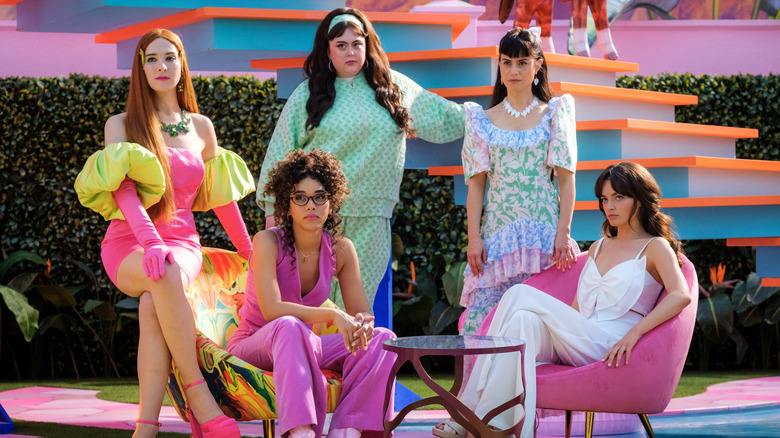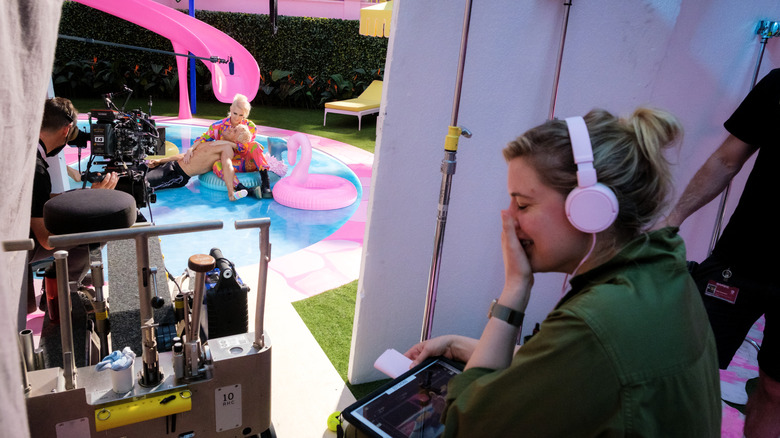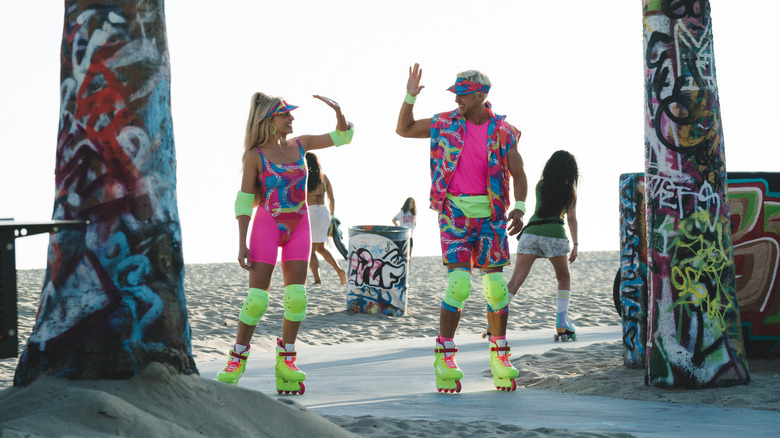Barbie Brought Back Moviegoers Who Hadn't Been In A Theater Since Before The Pandemic
Have you heard of this movie called "Barbie"? It's this little movie directed by a former mumblecore muse and starring the actress who played Juliet on a couple episodes of the Australian children's show "The Elephant Princess" that, uh ... had the biggest blockbuster opening of the year, grossed $1 billion at the worldwide box office in just 17 days, and in only its third week of release has earned a spot among the 100 most profitable movies of all time. It really and truly is Barbie's world, and we're all just living in it.
Greta Gerwig's life-and-times take on the iconic toy played by Margot Robbie has broken so many records and set so many new cultural milestones already. But there's one detail that deserves a close examination. According to a new report from the pre-release film tracking group The Quorum, a key component to the success of "Barbie" has been its ability to mint new moviegoers out of people who hadn't been to a theater since before the pandemic — or even longer.
The Quorum surveyed 1,800 people who went to see "Barbie" about their theater-going habits. The two largest chunks of respondents reported going to theaters "all the time" (46%) and "every now and then" (32%). It's no surprise that cinephiles, theater enthusiasts, and even sporadic theatrical experience enjoyers were successfully lured by the life in plastic. But it's that remaining 22% that's most intriguing, and most promising.
11% of respondents to Quorum's poll said "Barbie" was the first film they'd seen in a theater since the pandemic, and another 11% couldn't recall the last film they'd seen in a theater. That means nearly a quarter of "Barbie" ticket buyers were convinced to return to theaters after a long hiatus.
I am become Barbie, creator of new moviegoers
What does 22% of ticketholders translate to financially when we look at "Barbie's" box office, which is nearing $1.1 billion? If my math is correct, that's an added $242 million in ticket sales from people that otherwise wouldn't have shown up, or around 9 million people. "Barbie" would still be uber profitable had ~$250 mil been shaved off the top of its box office, but this isn't about the numbers themselves. These numbers point to a view of the audience that theatrical pessimists have long scoffed at or denied: cinema isn't irrevocably dying as tastes change toward at-home viewing where consumers have maximal choice; it may be that the studios simply aren't greenlighting the right movies. Or, more likely, that they aren't marketing them the right way.
Warner Bros. pulled off a marketing campaign for the ages around "Barbie." For months, every site you visited on the internet, every bus and billboard you passed, and every ad before a YouTube video was shiny, pink, and yes, fantastic. This marketing blitz has even left some with "Barbie fatigue," but it undeniably worked. There are other reasons for the success of "Barbie," like decades of brand loyalty accrued around the Mattel product and its coincidental counterprogramming against "Oppenheimer," which raised ticket sales across the board. People turned out for "Barbie" in a big way, and The Quorum has even more data to put a decidedly optimistic spin on that fact.
Retaining a new audience
After "Barbie" ticketholders saw the movie, they were asked how they felt about the prospect of returning to theaters. A large chunk of respondents (40%) replied enthusiastically, saying that "Barbie" had reminded them how much they love going to the movies and that they'll definitely go back. A smaller yet no less important sliver (15%) responded that "Barbie" was a one-off, and they aren't likely to be back to the theater any time soon. The studios and the executives that run them should focus their attention on that remaining 45%, who responded that they enjoyed the movie, but movies these days are expensive, so it's going to take another "Barbie" to bring them back.
The cynical side of me could see the extremely literal-minded studio bosses interpreting this data as a sign that what people really want is a Mattel Cinematic Universe. People liked toy movie! Make more toy movies! When really, people are likely saying that they want something different, something that feels fresh and exciting. Movie events that aren't tied to 14-film franchises with context stuffed across streaming series and comic books. Movies that tell real human stories — well, "Barbie" isn't exactly ... but movies like "Barbie" and "Oppenheimer" ring with the vigor of freedom. Free from overburdened IP, free from cultivated audience expectations, and imbued with the price kind of x-factor that drives ticket sales.
David Zaslav, I know you're reading this. Listen to the people who came back to theaters for "Barbie." We want something new!


